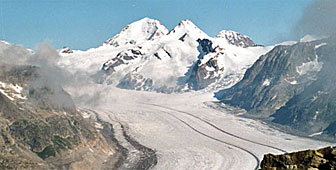Europe’s longest glacier comes step closer to becoming World Heritage Site

Switzerland's Aletsch glacier is likely to become a World Heritage Site, following a recommendation by an advisory body of Unesco's World Heritage Committee. It would be the first time a natural region of the Alps has been recognised as such.
An official at the World Heritage Committee in Paris confirmed that the recommendation to accept the “Jungfrau-Aletsch-Bietschhorn” bid was made at a meeting in Paris last week.
Natarajan Ishwaran told swissinfo that it was now “very likely” that the Committee would follow the recommendation when it meets in Helsinki in December.
The 470 square kilometre area includes the Aletsch glacier – at 24 kilometres, the longest in the Alps, the biodiversity found in the Aletsch forest on its flank, and the imposing Eiger, Mönch and Jungfrau mountains.
Experts say the Unesco label will bring attention to the effect global warming is having on alpine glaciers, like the Aletsch, which are receding at a great rate.
The Swiss-based World Conservation Union (IUCN), which played an active role in the evaluation of the bids, says the region is “a dramatic mountain landscape bearing testimony to the formation processes of the High Alps and demonstrating classic examples of glacial activity”.
David Sheppard of the IUCN said the Swiss bid was recommended for three reasons: the importance of the glacier, the area’s representation of alpine and sub-alpine habitats and its outstanding scenery.
But before the recommendation was made, the World Heritage committee had to be convinced that the bid was supported by local people and that the area in question was well managed.
In the case of the “Jungfrau-Aletsch-Bietschhorn” bid, the region has been under protection as a site of national importance since 1983. Plans in recent years to build a cable car across the gorge close to the tongue of the Aletsch glacier were blocked so as not to endanger the Unesco bid.
The World Heritage label would oblige Switzerland to protect the region for future generations.
The Swiss Federal Office for the Environment says World Heritage status will boost the economy in the area in question, which is based mainly on tourism.
If the bid is accepted in December, the “Jungfrau-Aletsch-Bietschhorn” region would join a select group of natural areas already declared World Heritage Sites, including the Grand Canyon in the United States and Mount Kilimanjaro in East Africa.
According to Sheppard, “it is one of the most exclusive labels for natural areas on the planet!”
by Dale Bechtel

In compliance with the JTI standards
More: SWI swissinfo.ch certified by the Journalism Trust Initiative










You can find an overview of ongoing debates with our journalists here . Please join us!
If you want to start a conversation about a topic raised in this article or want to report factual errors, email us at english@swissinfo.ch.